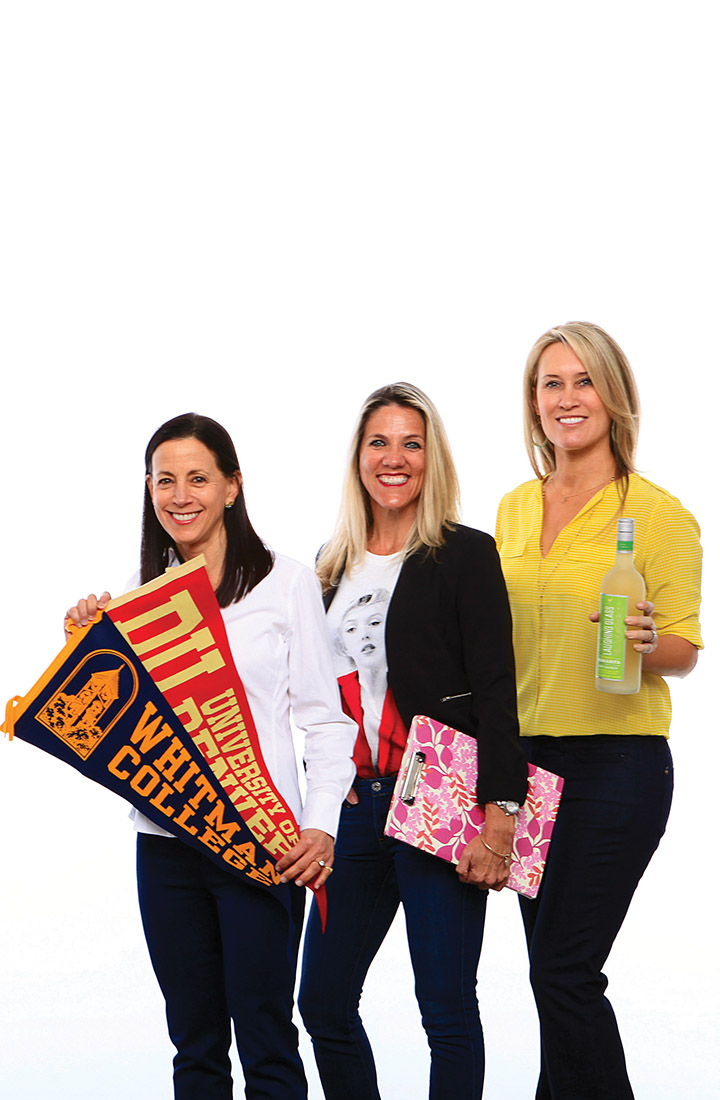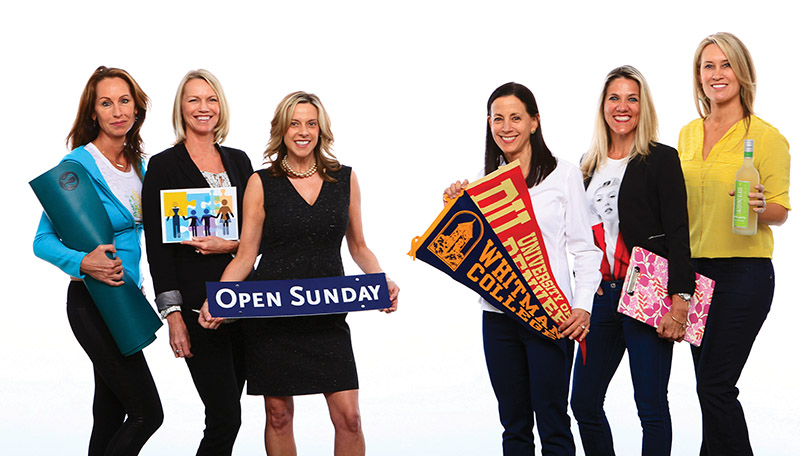
THERE COMES A point when the kids are in school for most of the day and the 24/7 duties of being a mom start to wane. For some, this is an opportunity to spend more time volunteering in the school and the community. For others, it’s a time to try yoga or tennis or even train for a marathon. Others take this newfound time as an opportunity to go back to work — that is, paid work. But “getting back in” to the workforce is easier said than done. Women who have been out for a while face a host of challenges, from explaining gaps in their resume to brushing up on advances in their industry to negotiating for salaries comparable to what they earned before. According to Wynn Burkett, a career and executive coach who runs “Getting Back in the Game” workshops in Marin and San Francisco for women thinking about re-entering the workforce after leaving to raise kids, the single biggest obstacle women face is loss of confidence. In this story we profile six Marin women who each had to work through the process of reinventing themselves. For some it took an intensive certification course, for others a college degree, but they all let their intuition guide them to a new direction.
Click through to each page to read more about these moms who jumped right back into work after raising their children.
The Corporate Recruiter
Sarah Spalding, Business Talent Group
 BEFORE SHE HAD KIDS, Sarah Spalding never pictured herself staying home and doing the “PTA thing.” But when her first baby was born, everything changed. Her job at Deloitte required that she work 10-hour-plus days at the office. She went down to 75 percent time but was still expected to deliver 100 percent results. After a few months back, she quit her job to be a full-time mom.
BEFORE SHE HAD KIDS, Sarah Spalding never pictured herself staying home and doing the “PTA thing.” But when her first baby was born, everything changed. Her job at Deloitte required that she work 10-hour-plus days at the office. She went down to 75 percent time but was still expected to deliver 100 percent results. After a few months back, she quit her job to be a full-time mom.
Fast-forward 10 years — three more kids and a few fulfilling years as chair for the local PTA — and Spalding was ready to go back to work.
“I was looking for more stimulation. My kids were in school till 3 p.m. I did the tennis thing, but then my friends started going back to work. I was looking for something else to do.”
After a year of trying out a sales and marketing job, Spalding has returned to what she used to do pre-kids — corporate recruiting. She works 32 hours a week for a company called the Business Talent Group, which places independent contractors with project-based work at Fortune 500 companies. She loves being back at work and is earning more than what she did in her career before starting a family.
“I love the income, the stimulation and working with people. I can see myself going to 40 hours,” she says. “Even though my work is 100 percent telecommuting, I still feel connected. I hook up with friends and we work together in cafes.”
Her Advice
• Open yourself to different opportunities. Tell people, “Hey, I can help you out,” and even be willing to work for free.
• Don’t be shy. Tell everyone you know — friends sitting next to you at a baseball game — that you are looking for a job.
• Start slowly. See what you can handle. The more you work, the more you will be able to take on.
The Entrepreneur
Carey Clahan, Laughing Glass Cocktails
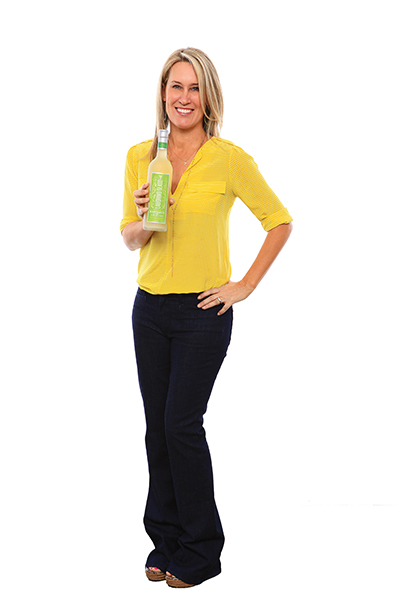 AFTER 13 YEARS OUT of the workforce, Carey Clahan felt a change of scenery was just what she needed to get back in step.
AFTER 13 YEARS OUT of the workforce, Carey Clahan felt a change of scenery was just what she needed to get back in step.
“My family’s three-year stint in Hong Kong was a turning point for me. We were living on the other side of the planet — no friends, no family,” says Clahan, who regained workforce confidence after getting hired overseas to do design work for a costume company. “In Hong Kong, it didn’t matter what my resume said. They wanted to hire Americans.”
When she returned to the States, Clahan connected with her longtime friends Sydney Rainin-Smith and Jill Korst, the latter known for making killer margaritas. “Jill had been hearing ‘You should bottle this’ her whole life,” Clahan says.
And so Laughing Glass Cocktails was born.
The women started out by perfecting their formula for the perfect margarita — a blend of (privately distilled) tequila, lime and agave. They each put in their own money to finance the project and have since raised additional funds from friends, family and angel investors.
But the start-up process was far from smooth sailing. “We met with tons of obstructions right away,” Clahan says. “We couldn’t have gotten into a more male industry — unless we were in pro football or something. We ran into a lot of ‘Ladies, you don’t know what you’re doing. You are never going to get that done.’ ”
It was partly true, she admits. “We didn’t know what we were doing. But we were good at doing our homework and studying up.” The women also relied on advisers who had been in the liquor industry and were able to guide them in the early days.
“None of us had ever run a business before. We needed a lot of advice,” she says. “We talked to everyone we knew about our idea.”
From concept to store shelves, it took the women one year and one day to launch their business (where Clahan serves as chief marketing officer), a very short period of time in the well-established, slow-moving liquor industry — and that time even included distilling their own tequila.
The company now has six full-time employees and in December it hired a new CEO, Lisa Berman, to help expand the business and raise more money. “The product is selling,” Clahan says. “We are in all the Whole Foods stores in California. We are talking to BevMo. Safeway is giving us a 10-store test, which is a big deal.”
When asked about juggling work and life, Clahan is very candid. “This is not a hobby,” she says. “When you have your own business, you are working all the time. "
Her Advice
• Find advisers who are experts in the industry. But be discerning about the advice you follow.
• Don’t let “no” stop you. Everyone says no to begin with.
• Check out places like the Hivery in Sausalito, a shared work space that also offers business support for female entrepreneurs.
The Real Estate Agent
Debbie Bernier, Coldwell Banker
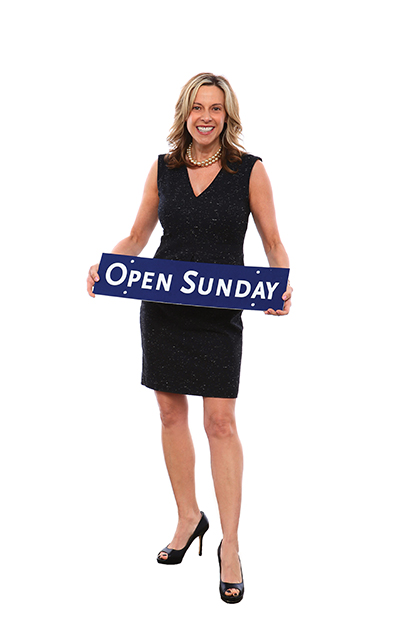 DEBBIE BERNIER WAS A pharmaceutical sales rep before she had her son, Cooper. Although she quit her job when he was born, she kept her “toes in the water,” working from home as a marketing consultant while raising her child. She always knew she wanted to go back to work.
DEBBIE BERNIER WAS A pharmaceutical sales rep before she had her son, Cooper. Although she quit her job when he was born, she kept her “toes in the water,” working from home as a marketing consultant while raising her child. She always knew she wanted to go back to work.
When Cooper started high school, Bernier was eager to go back to a job where she could work with people and be in a sales role. “I was craving interaction with other people,” she says. “My consulting work was all from home.”
She started talking to people at pharmaceutical companies, but the industry had changed drastically since she had been in it, and companies wanted to hire kids right out of college whom they could pay very little.
Then she had her aha moment. “My husband and I have owned nine homes,” she says. “We’ve moved quite a bit. Friends always call me for moving advice. Real estate was the logical fit.”
Bernier dove into her career transition with gusto. She enrolled in a three week- long, nearly full-time prep course for the real estate licensing exam. “I had a real Mary Tyler Moore moment my first day of class,” she says with a laugh. “I had taken the ferry into San Francisco and I thought to myself, ‘I am really doing this.’ It was super exciting.”
She passed the test on her first try (it has a 50 percent fail rate) and joined Coldwell Banker in Greenbrae. “Coldwell offers an in-depth training for new agents,” Bernier says. “It’s a six-week session where they give you every tool you need to build your franchise and be successful in your own business — all the technology and platforms you will need.”
A year and a half into her new career, Bernier feels like she has a new lease on the second half of her life. “I am 45, and I am part of this world that I never thought I’d be part of again,” she says. “I see myself doing this into my 80s.”
She went to visit a client recently, and although no one was home, there were tiny children’s shoes at the front door and a scooter in the driveway. “I thought to myself, ‘I gave this family a home. I really made a difference.’ ”
She cautions others thinking about getting into real estate that it is a lot of work. “The perception is that real estate agents don’t work hard,” she says. “I work seven days a week. Since January 1, I’ve been working 12-hour days.”
Her Advice
• Ask yourself, “What do my friends call me about? What am I known for? How can I turn that into a career?”
• Talk to other women. Ask them about their jobs and start networking.
• Imagine yourself as more than a mother or a wife. Don’t put yourself in a box.
The College Counselor
Heidi de Chatellus, Insights to College
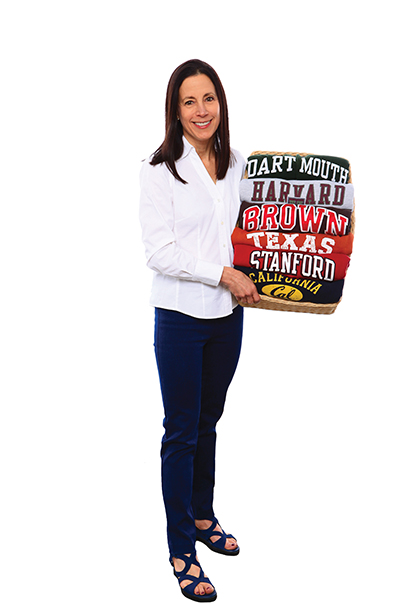 WHILE HELPING THE ELDEST of her three children through the college application process, Heidi de Chatellus had an epiphany.
WHILE HELPING THE ELDEST of her three children through the college application process, Heidi de Chatellus had an epiphany.
“I realized how complex this process can be for parents,” she says, “and thought there was a real need out there in the community for quality help.”
After 10 years of being a stay-at-home mom, she got a certificate in college admissions and career planning at UC Berkeley (cost: $4,000) and put out her shingle as an independent college counselor. As part of her training, she interned in the college counseling office at Lycée Français in San Francisco to gain hands-on experience working with students.
Her job is more than full-time. “I work from my home office, more hours than I care to count,” she says. “My mornings are focused on researching, keeping abreast of developments in education and reading student work. The rest of the day is spent meeting students and families.” She also travels quite a bit, visiting more than 150 colleges around the country and meeting with admissions officers on a regular basis.
Her favorite part of the job? “I really get to know the students I work with because I spend so much time with them over the course of a year or two,” de Chatellus says. “And I love seeing how happy they are when they receive the acceptance letters from their first-choice schools.”
Her Advice
• Think long and hard about where your true passions lie, and then follow them.
• Decide on the right time to go back to work. For de Chatellus, it was when her kids were in high school and more self-sufficient.
• Keep your skills up to date by attending professional conferences and workshops.
The Marriage and Family Therapist
Meredith McGarvey, Meredith McGarvey, LMFT
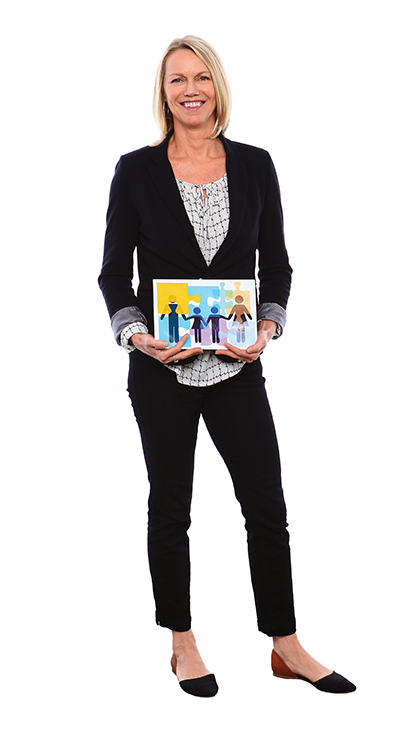 MEREDITH MCGARVEY TOOK A different path back into the professional world, one that involved a lot of education and trying something new. Before having kids, she worked as a corporate sales manager for Hyatt hotels. “I had always imagined myself continuing to work after I had children, but the challenge was finding something in my field that I could do part time,” she says.
MEREDITH MCGARVEY TOOK A different path back into the professional world, one that involved a lot of education and trying something new. Before having kids, she worked as a corporate sales manager for Hyatt hotels. “I had always imagined myself continuing to work after I had children, but the challenge was finding something in my field that I could do part time,” she says.
When her first child was 9 months old, the family relocated to London for her husband’s job. They were there for eight years, and McGarvey could not work because she didn’t have a work visa. She took this opportunity to take a few classes and look at options for a second career.
“At the time I had no idea what that career would look like, but taking classes certainly kept my brain stimulated,” she says. “After my second psychology class, I was hooked.”
McGarvey started talking to professionals and professors about careers in psychology and did some volunteer work as a phone counselor with a help line for children. “I realized that if it took me several years to complete my master’s in counseling, my kids would be at a more independent age and I could start my new full-time career,” she says.
After seven years — four at San Francisco State earning a master’s degree in counseling and three doing fieldwork — McGarvey is now a licensed marriage and family therapist with a private practice in Larkspur.
“I work with adults, couples and adolescents, with a specialty in helping families transition through divorce and helping teens with anxiety and stress,” she says. “I also work in Marin County high schools as the program coordinator of TeenScreen, which identifies teens at risk for emotional and social difficulties.”
Discussing her career transition, McGarvey admits that it was challenging juggling being back in school, training as a therapist (which requires 3,000 hours of fieldwork) and being there for her kids.
But she feels the benefits of going back to school and work far outweigh the costs. “I am so happy that I have a fulfilling career now that my kids are in high school and busy with their own lives. Along the way, they’ve learned some really valuable skills like cooking, cleaning and feeling a sense of competency,” she adds. “Overall, going back to work has made me a better mom, a role model for my kids and a much happier person.”
Her Advice
• Stay connected and keep learning while out of work. Take classes to get back up to speed or to see what interests you.
• Maintain contacts with your old career network if you might go back to your prior line of work.
• Make contacts in your new line of work if you are thinking of switching careers.
The Yoga Teacher
Susan Hauser, Susan Hauser Yoga
 AFTER BECOMING PREGNANT WITH her second child, Susan Hauser learned her husband Bill had been diagnosed with cancer. He passed away just a year after the baby was born.
AFTER BECOMING PREGNANT WITH her second child, Susan Hauser learned her husband Bill had been diagnosed with cancer. He passed away just a year after the baby was born.
“I was a widow and a single mom. My boys were 1 and 2 years old,” she says. “Fortunately, my husband’s family was here, and they were very supportive. I didn’t have to work. I could stay home and raise my kids.” During this time she also discovered yoga and found it to be therapeutic both physically and psychologically.
As her two boys got older, she knew she wanted to go back to work. “I wanted to meet people and be more independent with my finances,” Hauser says. She just wasn’t sure what she wanted to do. “I always had a job, ever since I was 15.”
Hauser tried sales but just wasn’t making any money. Finally, during the summer of 2009, she sent her two kids back east to stay with her parents and completed a one-month (200-hour) intensive training course to get certified as a yoga teacher. It cost almost $3,000, but it taught her what she needed to know to start teaching. Her career started slowly, first with teaching friends in her backyard, then with expansion to a rented a room at the Strawberry Recreation Center to accommodate her growing class.
Suddenly, she was making real money. According to Hauser, yoga teachers in this area earn between $50 and $75 per class. Others charge by the mat, $4 and up for each student. She sat down to figure out how she could make her teaching into a business.
“I started to focus. I wrote down my goals and the direction I was going in. I knew people liked my class. I was passionate about yoga,” she says. “If I could figure out the money part, I knew this would be the ideal job for me.”
Her opening came one morning when she went to a class at Red Dragon and the yoga teacher didn’t show up. The owner of the studio said to her, “Well, either you teach it, or I will.” Hauser grabbed the opportunity and taught the class. Eventually she started to sub for other Red Dragon teachers and picked up every class she could teach.
Hauser was able to build a following in Marin because she knows her customer, she says. “My clients want the benefits of the yoga that grounds you, makes you more centered and connected. But they also want a good workout.”
She is now signed on as a regular instructor with Yoga Tree in Corte Madera and is a brand ambassador for lululemon. She consistently teaches between 80 and 100 people every day and is branching out into retreats.
Hauser says yoga has changed her life. “Teaching yoga has given me more confidence, in everything,” she observes. “I’m more grounded. I’m happier. I’m more positive. I like having that independence, having my own thing. I feel like a completely different person. It’s great for my kids to see that I’m happier doing what I do, even though I miss some of their games on the weekends. I definitely juggle a lot.”
Her Advice
• Figure out what you’re passionate about and start from there.
• Be ready to start at the bottom and work your way up.
• Find your niche. “I knew at the time there wasn’t a lot of power yoga in Marin and that was what people wanted.”

